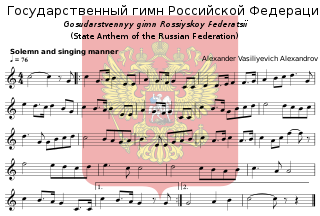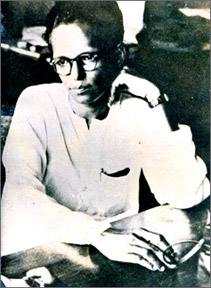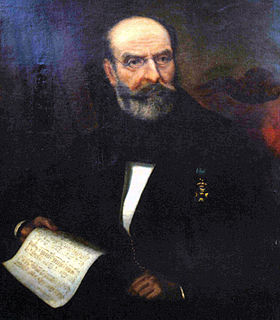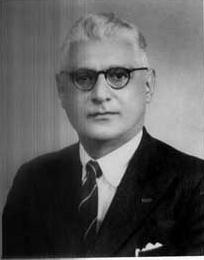
"Kimigayo" is the national anthem of Japan. The lyrics of "Kimigayo" are probably the oldest among the world's national anthems, and with a length of 32 characters, they are also the world's shortest. The lyrics are from a waka poem written by an unnamed author in the Heian period (794–1185), and the current melody was chosen in 1880, replacing an unpopular melody composed by John William Fenton eleven years earlier. Its length of 11 measures is currently among the world's shortest. While the title "Kimigayo" is usually translated as "His Imperial Majesty's Reign", no official translation of the title or lyrics has been established in law.
The "State Anthem of Turkmenistan", also known as the "National Anthem of Independent Neutral Turkmenistan", was adopted as the national anthem of Turkmenistan in 1996, then again with modified lyrics in 2008. The music was composed by Turkmenistani composer Veli Mukhatov, who also composed the music of the Turkmen SSR's regional anthem.

The AFC Asian Cup is the primary association football competition contested by the senior men's national teams of the members of the Asian Football Confederation (AFC), determining the continental champion of Asia. It is the second oldest continental football championship in the world after Copa América. The winning team becomes the champion of Asia and until 2015 qualified for the FIFA Confederations Cup.

The "State Anthem of the Russian Federation" is the national anthem of Russia. It uses the same melody as the "State Anthem of the Soviet Union", composed by Alexander Alexandrov, and new lyrics by Sergey Mikhalkov, who had collaborated with Gabriel El-Registan on the original anthem. From 1944, that earliest version replaced "The Internationale" as a new, more Soviet-centric and Russia-centric Soviet anthem. The same melody, but without any lyrics, was used after 1956. A second version of the lyrics was written by Mikhalkov in 1970 and adopted in 1977, placing less emphasis on World War II and more on the victory of communism, and without mentioning the denounced Stalin by name.

"Azərbaycan marşı" is the national anthem of Azerbaijan. The music was composed by Uzeyir Hajibeyov, with lyrics by poet Ahmad Javad. The government officially adopted the anthem in 1920 with the passage of the decree, "On the State Hymn of the Republic of Azerbaijan." In 1992, after the fall of the Soviet Union, Azerbaijan's government officially restored "Azərbaycan Marşı" as the national anthem.
The music of Saudi Arabia includes both Western and traditional music. The most distinguished musician in recent Saudi history is Tariq Abdulhakeem, who composed hundreds of famous Saudi songs for himself as well as for other singers. Saraj Omar has become a very prominent composer after writing the music for the Saudi national anthem. In 1999, Mohammed Abdu The most famous singer in the Arab World and Talal Maddah who died in August 2000 while singing in the summer festival on the stage of Al-Muftaha Theatre in the southern region of Saudi Arabia. The 1st Arab Pioneers Festival, which was held in Cairo under the patronage of the Arab League, honored four of the lead composers in Saudi Arabia: Tariq Abdulhakeem, Ghazi Ali, Mohamed Alsenan, and Mohammed Shafiq. Of the same generation are the oud virtuoso Abadi al Johar, Rabeh Saqer and Abdul-Majeed Abdullah.

The "Qaumī Tarānāh", also known as "Pāk Sarzamīn", is the national anthem of the Islamic Republic of Pakistan. It was written by Hafeez Jalandhari in 1952 and the music was produced by Ahmad G. Chagla in 1949, preceding the lyrics.

The flag of the United Arab Emirates contains the Pan-Arab colors red, green, white, and black. It was designed in 1971 by Abdullah Mohammed Al Maainah, who was 19 years old at that time, and was adopted on 2 December 1971. The main theme of the flag's four colors is the unity of Arab nations. In 2008, there was a minor change to the Emblem.
"as-Salām al-ʾAmīrī" is the national anthem of Qatar, written by al-Shaykh Mubārak bin Sayf al-Thānī and composed by ʿAbdulʿazīz Nāṣṣir al-ʿUbaydān al-Fakhrū.

The Asian Football Confederation is one of the six confederations within FIFA and is a governing body of association football, beach soccer, and futsal in some countries/territories in Asia and Oceania. It has 47 member countries most of which are located in Asia. Australia, formerly in OFC, joined AFC in 2006. Guam, a territory of the United States, and the Northern Mariana Islands, one of the two commonwealths of the United States are also AFC members that are geographically in Oceania. Hong Kong and Macau, while not independent countries, are members of AFC.

The State Anthem of the Turkmen SSR was adopted in 1946 and used until 1991 by the Turkmen SSR as a regional anthem. When Turkmenistan became an independent state in 1991, the regional anthem became the national anthem of Turkmenistan, and was used as such until late 27 September 1996, although without lyrics, as the Soviet-era lyrics were discontinued upon Turkmenistan's independence from the Soviet Union.

Egodahage George Wilfred Alwis Samarakoon known as Ananda Samarakoon was a Sri Lankan (Sinhalese) composer and musician. He composed the Sri Lankan national anthem "Namo Namo Matha" and is considered the father of artistic Sinhala music and founder of the modern Sri Lankan Sinhala Geeta Sahitya. He committed suicide in 1962, possibly driven by unauthorized changes to lyrics in a composition.

Nikolaos Chalikiopoulos Mantzaros was a Greek-Italian composer born in Corfu, major representative and founder of the so-called Ionian School of music.

Ahmed Ghulam Ali Chagla was a Pakistani musical composer who famously wrote the music for the national anthem of Pakistan in 1949. A scholar and writer, he was also an active member of the Theosophical Society.
Al-watan, meaning homeland, heimat, country, or nation, may refer to:
The Tibetan National Anthem, known as "Gyallu", is the anthem of the Tibetan Government in Exile and is strictly banned by the People's Republic of China, especially in the Tibet Autonomous Region. It was written by Trijang Rinpoche in 1950.

Lyndon Slewidge is a retired Ontario Provincial Police officer. He is also a singer who specializes in national anthems. He was the official anthem singer for the Ottawa Senators ice hockey club between 1994 and 2016 and is familiar with at least 13 national anthems. Slewidge typically ends an anthem with a salute, a wink and a thumbs up sign.

The following outline is provided as an overview of and topical guide to Qatar:

"This is the Home of the Brave" is a Pashto-language nasheed and the national anthem of the Islamic Emirate of Afghanistan. It is an a cappella song, meaning that it does not contain musical instruments, as instruments are considered haram by many Islamic scholars in Afghanistan.













